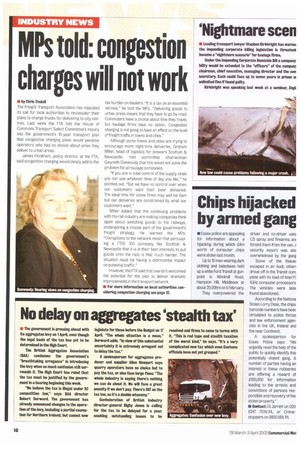MPs told: congestion charges will not work
Page 10

If you've noticed an error in this article please click here to report it so we can fix it.
• by Chris Tindall
The Freight Transport Association has repeated its call for local authorities to reconsider their plans to charge trucks for delivering to city centres. Last week the FTA told the House of Commons Transport Select Committee's inquiry into the government's 10-year transport plan that congestion charging plans would penalise operators who had no choice about when they deliver to urban areas.
James Hookham, policy director at the FA, said congestion charging would simply add to the tax burden on hauliers. "It is a tax on an essential service," he told the MPs. "Delivering goods to urban areas means that they have to go by road. Commuters have a choice about how they travel, but haulage firms have no option. Congestion charging is not going to have an effect on the level of freight traffic in towns and cities."
Although some towns and cities are trying to encourage more night-time deliveries, Graham Miller, head of logistics for brewers Scottish & Newcastle, told committee chairwoman Gwyneth Dunwoody that this would not solve the problem for all haulage companies.
"If you are in total control of the supply chain you can use whatever time of day you like." he pointed out. "But we have no control over when our customers want their beer delivered. The ideal time for some firms may well be 6am but our deliver-es are constrained by what our customers want."
Miller added that the continuing problems with the rail industry are making companies think again about switching goods to the railways, endangering a crucial part of the government's freight strategy. He warned the MPs: "Disruptions to the network mean that persuading a FTSE 100 company like Scottish & Newcastle that it is in their best interests to put goods onto the rails is that much harder. The situation must be having a detrimental impact on potential traffic."
However, the ETA said that overall it welcomed the potential for the plan to deliver dramatic improvements in the transport network.
• For more information on local authorities considering congestion charging see page 12.
























































































































































